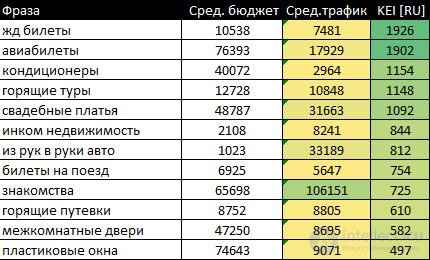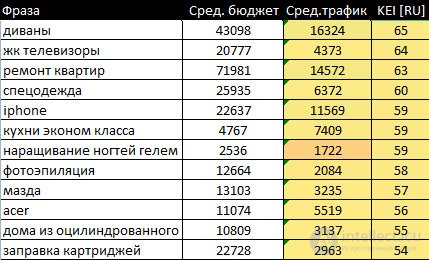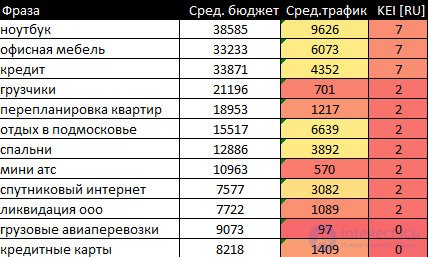The Keyword Effectiveness Index (KEI) is a keyword evaluation, expressed in numerical terms, giving an idea of its effectiveness in terms of search promotion.
From the very beginning of the use of the program - this is the main indicator that was asked to include in the functionality. I have never understood its relevance for the Runet, if someone can justify it from a scientific point of view, or at least everyday, I ask you to do this very hard in the comments.
As a result, experiments with the formula are still ongoing, and the program has a primitive evaluation formula based on queries and competition on Yandex. I would like to receive from the readers, especially from those who own their own developments - adequate estimates of the KEI indicators obtained for the list of previously already parsed, but now with this indicator, for 350 keywords, which are mostly competitive.
Who cares meticulously to understand this issue, can read the materials in the network, as an option. Well, we will proceed to the examples, on the basis of which I concluded that the option embodied in the program will be optimal.
Sumantra Roy is a well-known SEO expert in the West, so he works with Google. We, for the most part, in RuNet, work with Yandex, but now for the residents of Ukraine, of course, it will seem more necessary, because Google dominates there, as far as I know. Therefore, we will continue to look for the optimal version of the formula, taking into account as many factors as possible.
KEI is just an approximate indicator of the effectiveness of keywords , but not an indicator of quality, so you should treat it only in combination with other analytical data, otherwise you may be held hostage by standards that someone has thought up.
- KEI to 10 - bad requests that should not work.
- KEI from 10 to 100 - good requests, with the presence of traffic, you can work with them.
- KEI from 100 to 400 - excellent requests that allow you to receive a significant proportion of traffic.
- KEI more than 400 - requests of the highest category with mega-portions of traffic and a large number of audience.
Following this graduation, we parsed 350 requests to see their effectiveness.
Key Collector users can download the project file, and those who have not yet purchased the Excel version. What results were obtained?
The maximum level of the KEI index was obtained for such words as "s- e+ x" (of course, where without the most popular word), "train tickets", "airline tickets", "air conditioners", "last minute tours".

Average values from the list received requests of such an order as: "sofas", "iphone", "apartment renovation".

In Jo .. more precisely, such requests as “monitor”, “dental treatment”, and “credit” received a bad mark.

Naturally, the indicators were selected queries, traffic for which is known not only according to the aggregators, but also from projects to which I have access or promote personally. As a result, the formula was tightened just for them, so the well-deserved zeros got "gardening" and "dump truck". At the same time, various options for car requests and equipment received well-deserved figures from 20 to 300.
In these calculations, I relied on traffic, as an opportunity not to ephemerally “touch” KEI, and not “deaf” to hope for its digital value. I would like to hear your comments, especially those who are constantly working with the keyword performance index.
When obtaining KEI data, rounding to integers was used (0.5 = 0, 0.6 = 1), but in general, if tenths or hundredths are needed, they can be shown in the program. I repeat - while being beta tested for Runet.


Comments
To leave a comment
seo, smo, monetization, basics of internet marketing
Terms: seo, smo, monetization, basics of internet marketing